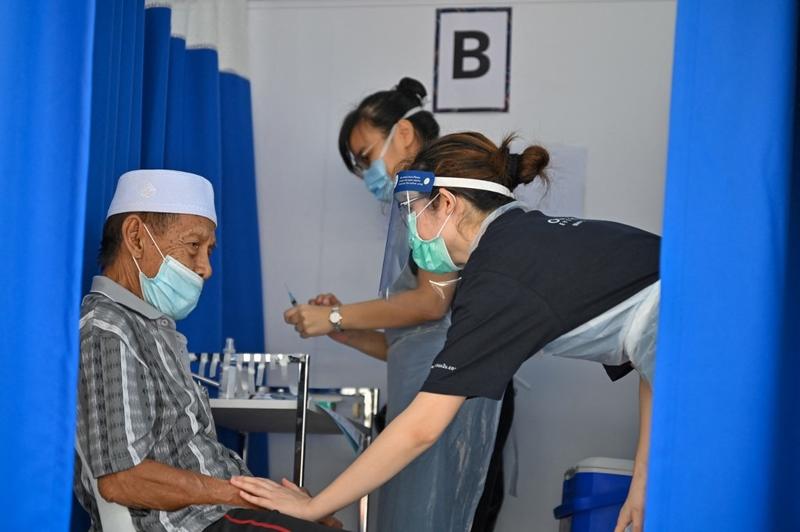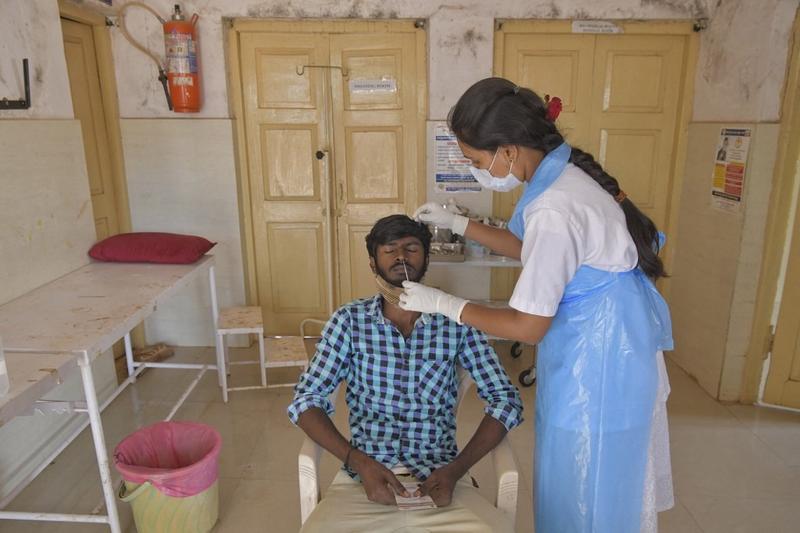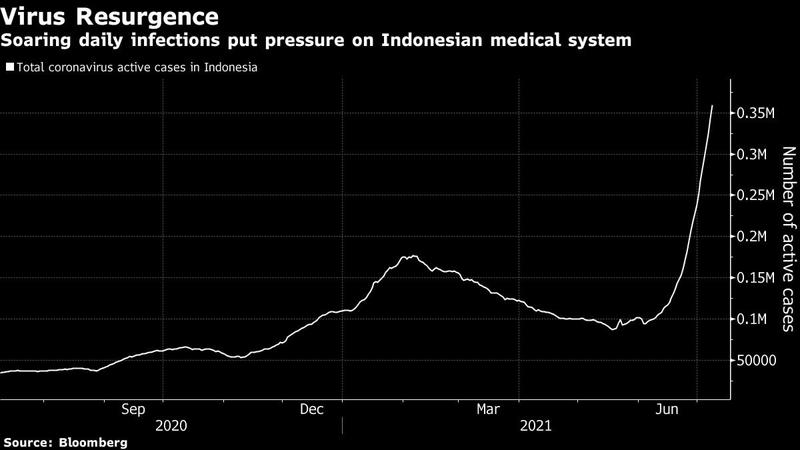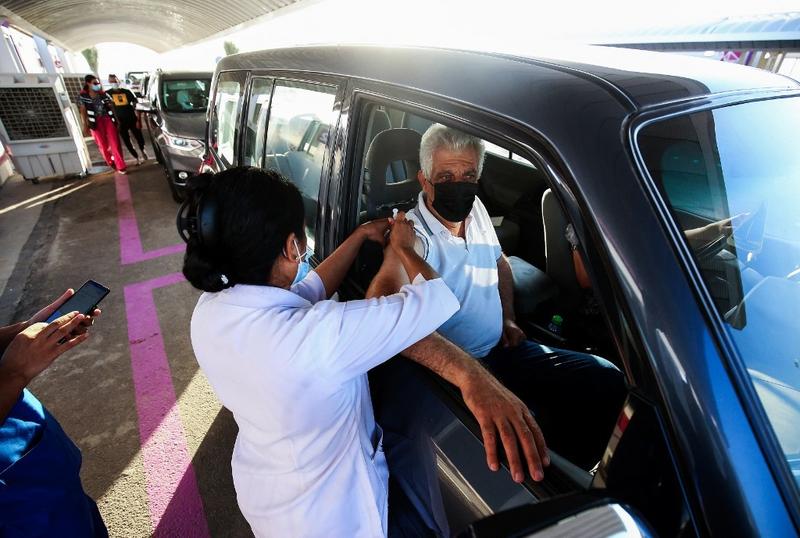 A medical staff member comforts an elderly man before administering a dose of a COVID-19 vaccine on a mobile vaccine truck in Kuala Lumpur on June 21, 2021. (MOHD RASFAN / AFP)
A medical staff member comforts an elderly man before administering a dose of a COVID-19 vaccine on a mobile vaccine truck in Kuala Lumpur on June 21, 2021. (MOHD RASFAN / AFP)
PHNOM PENH / NEW DELHI / JAKARTA / TEHRAN / BAGHDAD / KUWAIT CITY / ULAN BATOR / YANGON / WELLINGTON / ISLAMABAD / MANILA / BANGKOK / KATHMANDU / HANOI / JERUSALEM / ISTANBUL - Malaysia on Friday reported the biggest single-day increase in new coronavirus cases since the outbreak began, even as authorities impose tighter movement restrictions in several areas to curb infections.
The Southeast Asian nation added a record 9,180 COVID-19 cases, as well as 77 deaths, according to Health Director-General Noor Hisham Abdullah. The previous record was 9,020 on May 29.
Although an accelerated vaccine roll-out has allowed the government to ease virus curbs in six states, providing some breathing space to the economy, much of the country remains under lockdown since June 1.
The latest figures bring the total number of infections in Malaysia to 817,838, according to Noor Hisham. Selangor, the richest state, continue to lead the surge with 4,400 cases on Friday, followed by 1,271 from capital city Kuala Lumpur.
READ MORE: Malaysia sees highest daily virus toll, total cases surpass 800,000
Afghanistan
The World Health Organization is concerned about worsening access to provide life-saving medicines and supplies in Afghanistan and attacks on health care facilities, as Afghan forces fight Taliban insurgents, a WHO official said on Friday.
Rick Brennan, WHO regional emergencies director for its Eastern Mediterranean regional office, said that aid supplies would arrive next week including 3.5 million COVID-19 vaccine doses and oxygen concentrators.
“It is a terribly concerning situation and it’s very fluid right now,” Brennan, speaking from Cairo, told a UN briefing in Geneva. “We are concerned about our lack of access to be able to provide essential medicines and supplies and we are concerned about attacks on health care.”
Australia
Australia’s drug regulator on Friday tweaked its regulations to permit an offer of alcohol for those inoculated against COVID-19 after earlier barring a pub from doing so and prompting the country’s prime minister to step in.
Earlier in the day, Prime Minister Scott Morrison said the initiative by Melbourne’s Prince Alfred Hotel to offer complimentary alcohol to COVID-19 vaccinated patrons was a “good hearted” initiative and in the national interest.
He described the Therapeutic Drugs Administration’s (TGA) disapproval as “heavy-handed” during a televised news briefing. The TGA had disapproved of the plan as rules bar the use of alcohol or tobacco as incentives to receive medicines.
He said Health Minister Greg Hunt would speak to the TGA and ask them to back down.
Also, an instant COVID-19 sensor with expected future applications in essential workplaces is now being further developed by researchers from Australia's Royal Melbourne Institute of Technology (RMIT) and its partners, for planned commercial release in early 2022.
The Soterius Scout sensor unveiled by the university on Friday, can detect the presence of tiny amounts of the COVID-19 virus and its variants within a minute to provide the all-clear for someone to enter the work environment.
Researchers have successfully created the prototype, and they said the technology will be manufactured in Australia with future applications in essential workplaces and high-traffic settings including hospitals, aged care, quarantine hotels, airports and schools.
Australia's state of New South Wales Friday announced to further tighten restrictions on Greater Sydney and surrounding areas as the state continues to see a surge in daily increase of COVID-19 cases.
Morrison said a deal with Pfizer Inc, which will see millions of coronavirus vaccine doses to be delivered ahead of previous schedules, will mean every Australian will be offered at least one jab by year-end.
Pfizer will deliver about 1 million doses a week from July 19, more than double the weekly average of about 350,000 in June. Australia now expects to receive 2.8 million Pfizer jabs this month and more than 4.5 million in August, a spokesperson for Morrison said. The race is on to boost inoculations as Sydney’s delta outbreak intensifies, leading to new restrictions announced on Friday.
Cambodia
Cambodia confirmed 988 new COVID-19 cases on Friday, pushing the national caseload to 59,045, the Ministry of Health (MoH) said in a statement.
The new infections included 789 local cases and 199 imported cases, the MoH said.
A total of 30 new fatalities had been confirmed, taking the overall death toll to 855, the ministry said, adding that 897 patients recovered, bringing the total number of recoveries to 50,917.
 A health worker conducts a swab test for COVID-19 at the Kanaswadi Public Health Centre (PHC) on the outskirts of Bangalore on July 7, 2021. (MANJUNATH KIRAN / AFP)
A health worker conducts a swab test for COVID-19 at the Kanaswadi Public Health Centre (PHC) on the outskirts of Bangalore on July 7, 2021. (MANJUNATH KIRAN / AFP)
India
India's devastating second coronavirus wave, which has raged since March and killed thousands of people, is not over yet, a senior government official said on Friday, warning citizens to avoid crowding at tourist places.
"The war is not over yet," Vinod Kumar Paul, who heads a federal government panel on vaccines told a news conference on Friday, minutes after a video was played showing maskless people crowding at a waterfall in the Himalayan state of Uttarakhand.
India is now reporting a tenth of its peak daily numbers in May. On Friday, it reported 43,393 new COVID-19 cases in the last 24 hours, according to data from the health ministry, down from more than 400,000 in May.
Health officials said more than half of new COVID-19 infections were being reported from the southern state of Kerala and western state of Maharashtra, with the health ministry working with the states to control the spread of infections.
The country's vaccination drive has also slowed down, with less than a tenth of the 950 million eligible adult population fully vaccinated so far, two months after the federal government opened inoculations for all adults.
Indonesia
Indonesia will extend tighter movement limits to islands beyond Java and Bali, as infections driven by the delta variant pick up across the country.
Regencies and cities most affected by the coronavirus will face the same restrictions as in economic centers of Java and Bali islands, including full work-from-home order for non-essential sectors with shopping centers shut and restaurants serving takeaway only, said Airlangga Hartarto, coordinating minister for economic affairs. The new curbs will take effect July 12.
Southeast Asia’s largest economy is also the country worst hit by the pandemic in the region. As many as 38,124 people were confirmed to have the coronavirus in the 24 hours through Friday, with 871 dying from the disease. That was the first day in six that Indonesia didn’t mark a new record in infections.
Hospitals in many provinces are running out of beds and oxygen supply, hampering their ability to treat patients with severe symptoms. President Joko Widodo called on students, housewives and community health activists to volunteer at COVID-19 facilities.
The government has been meeting its target of giving out 1 million doses each day in July. It will also give a third shot to 1.47 million healthcare workers using Moderna Inc. vaccine starting next week in a bid to boost their protection against the virus, said Health Minister Budi Gunadi Sadikin.
While Indonesia was among the fastest Southeast Asian nation to secure vaccine deals, it was still hampered by delayed shipment and global shortages. It expects to receive 441 million doses this year, and has enough shots to meet its target through October.
The number of COVID-19 cases in Indonesia rose by 38,124 within one day to 2,455,912, with the death toll adding by 871 to 64,631, the Health Ministry said on Friday.

Iran
Iran on Thursday reported 23,391 new COVID-19 cases, raising the country's total infections to 3,327,526.
The pandemic has so far claimed 85,359 lives in Iran, up by 136 in the past 24 hours, the Iranian Ministry of Health and Medical Education said.
Iraq
The Iraqi Ministry of Health reported on Thursday 9,189 COVID-19 infections, the highest daily record since the outbreak of pandemic, while the ministry warned of the seriousness of the epidemiological situation in the country.
"The Ministry of Health confirms that the epidemiological situation has become dangerous, and the infections are rapidly increasing in this wave," the ministry said in a statement.
The ministry blamed the citizens for not abiding by the health-protective measures, calling on citizens to take the matter seriously and fully adhere to the protective measures, and called on them to immediately go to the vaccination centers spread around the country to receive the vaccination, according to the statement.
The nationwide caseload in Iraq thus rose to 1,406,289.
The ministry also confirmed 31 more deaths, bringing the death toll from the virus to 17,444, while the total recoveries in Iraq climbed by 5,139 to 1,287,903.
Israel
Israel's Ministry of Health on Friday issued a travel ban for Israelis to Uzbekistan and Belarus, citing a high level of coronavirus morbidity.
The ban starting July 12 will enlarge an existing list that bans traveling to Mexico, Argentina, Brazil, India, South Africa and Russia.
Israeli citizens and permanent residents who want to travel to one of the eight countries must request permission from an exception committee.
Inbound passengers from the eight countries, including recovered and vaccinated ones, must enter a 10-day quarantine.
 A medic administers a dose of a COVID-19 vaccine to people queueing in their cars at a drive-thru inoculation site at the Jaber al-Ahmad al-Sabah causeway in the Kuwaiti capital Kuwait City, on July 5, 2021. (YASSER AL-ZAYYAT / AFP)
A medic administers a dose of a COVID-19 vaccine to people queueing in their cars at a drive-thru inoculation site at the Jaber al-Ahmad al-Sabah causeway in the Kuwaiti capital Kuwait City, on July 5, 2021. (YASSER AL-ZAYYAT / AFP)
Kuwait
Kuwait registered on Thursday 1,705 new COVID-19 cases, raising the total infections in the country to 370,932, the Kuwaiti Health Ministry said.
The ministry also announced 12 more fatalities, taking the death toll from the virus in Kuwait to 2,071, while the tally of recoveries rose by 1,621 to 350,471.
Mongolia
Mongolia reported 2,308 new cases of COVID-19, and five more deaths from the virus, raising the national counts to 134,270 and 687 respectively, the country's health ministry said Friday.
Myanmar
Myanmar will temporarily close all schools of basic education once again, due to the recent detection of highly infectious COVID-19 virus variants in the Asian country, according to a release from the Ministry of Health and Sports late Thursday.
The closure of basic education schools including private schools and Buddhist monastic schools, after a reopening last month, was set to start from Friday and last through July 23.
On Thursday, Myanmar reported 4,132 new confirmed cases of COVID-19, bringing the total tally to 180,055. In addition, the COVID-19 related death toll rose to 3,621 with 51 new deaths recorded in the previous 24 hours.
Nepal
The first batch of Chinese COVID-19 vaccines purchased by the Nepali government arrived in the capital of Kathmandu on Friday in a major boost to the Himalayan country's stagnating vaccination drive.
"A plane of Nepal Airlines carrying the Chinese vaccines landed at Tribhuvan International Airport at 7 a.m. on Friday," Dim Prasad Poudel, managing director of Nepal Airlines, told Xinhua. "More flights for Beijing are scheduled for July 15 and July 22 to bring additional vaccine doses from China."
It is the first time the South Asian country has purchased COVID-19 vaccine doses from China. According to officials from Nepal's Health Ministry, the country bought the vaccines developed by the Chinese company Sinopharm.
New Zealand
Rising case numbers in Australia's New South Wales (NSW) has changed public health advice and means flights back from NSW will not start from midnight Friday as was intended, COVID-19 Response Minister Chris Hipkins said on Friday.
"Case numbers in Sydney show no sign of plateauing and NSW has today ramped up restrictions again," Hipkins told a press conference.
New Zealand has moved to act on new advice to hold off on managed return flights from the state for three more days, Hipkins said.
As a result, work is underway to stage flights from July 13 to Auckland and Christchurch airports only. Fourteen days at managed isolation and quarantine facilities (MIQ) will be a temporary requirement for travelers from NSW from Tuesday, he said.
Pakistan
Pakistan on Thursday confirmed 1,737 new COVID-19 cases, the National Command and Operation Center (NCOC) said on Friday.
The NCOC said that the country's number of overall confirmed cases has risen to 969,476, including 911,383 recoveries.
The number of active cases has risen to 35,573 who are under treatment across the country, including 1,971 critical patients.
According to the NCOC, the pandemic killed 25 people on Thursday, taking the overall death toll to 22,520.
 A man walks out from the SMRT subway train station in Chinatown district in Singapore on July 7, 2021. (PHOTO / BLOOMBERG)
A man walks out from the SMRT subway train station in Chinatown district in Singapore on July 7, 2021. (PHOTO / BLOOMBERG)
Singapore
Singapore will not take the same approach as the UK and US for mass reopening, but neither will it keep the sort of restrictive outlook that China and Australia have adopted, Health Minister Ong Ye Kung said.
“I think what we want is to take a more middle path. Get ourselves vaccinated, that’s critical, maintain both containment and mitigation measures,” Ong said in an interview with Bloomberg Television’s Haslinda Amin, adding the country would “open up progressively package by package, nothing big bang, and each step of the way make sure we keep populations safe.”
Singapore has rapidly expanded access to vaccinations in recent weeks, opening immunization to almost everyone 12 and older. The result has been a surge in vaccinations where the city-state now has one of the best vaccination rates in Asia and has administered more first doses than New York and London.
Government leaders here for more than a year pursued a relatively-successful “Covid-Zero” strategy that limited severe cases and deaths with strict border controls, mandatory masks and aggressive social distancing and contact tracing efforts.
Mass vaccination will be the key to reopening in a world where COVID-19 probably can’t be eradicated, the government has said, with a goal of eventually being able to manage COVID-19 like influenza.
Singapore is on track to hit its goal of two-thirds of the population fully vaccinated by National Day, August 9, although Ong warned that herd immunity may be elusive because of more highly-transmissible variants of the disease.
“To get herd immunity you may need 90-95 percent of your population vaccinated and we may not get there, not even a place like Singapore where there’s a lot of trust between people and institutions,” Ong said. “We may get 80 percent if we are lucky, which means it’s difficult to get to herd immunity, but what we can achieve is to arrive at an endemic situation where you can live with the virus.”

A medical worker wearing protective gear in a booth, takes sample from a man during a COVID-19 testing at a coronavirus testing site in Seoul, South Korea, July 9, 2021. (LEE JIN-MAN / AP)
South Korea
South Korea is raising social distancing in Seoul to its highest level, banning gatherings of three or more people after 6 pm and ordering night-time entertainment businesses to close, as the capital is at the center of a surge in coronavirus cases.
The country is moving social distancing rules to the top level of 4 for Seoul, where the majority of new cases in recent days has emerged with sporadic outbreaks at restaurants, bars and shopping malls. The latest surge is a setback for a country that has been lauded as a model for containing the outbreak without imposing a lockdown.
The measures to be imposed for Seoul would be the strictest since the South Korean government restricted businesses in the city of Daegu after an outbreak at a mega church early last year, which led to the country’s first major surge.
The measures will take effect July 12 and last for two weeks, South Korea’s Prime Minister Kim Boo-kyum said in a televised address. Seoul has posted record cases in the past two days after the country eased social distancing rules, which have since been rescinded.
After a slow start amid a supply shortage, South Korea has stepped up vaccinations and now has inoculated about 30 percent of the population with at least one dose. About 11 percent of the population have been fully vaccinated. The country on Friday reported another day of record cases of 1,316.
The US Forces Korea (USFK) said on Friday that it will tighten quarantine measures for US service members for two weeks amid the surging number of confirmed COVID-19 cases in South Korea in recent days.
The USFK said in a statement that it will implement enhanced COVID-19 mitigation measures for two weeks through July 23 due to the recent rise of COVID-19 cases within the USFK and South Korea.
Regardless of vaccination status, all bars and clubs will be off-limits for all US troops here for the two weeks.
Thailand
Tougher restrictions are being imposed in Thailand's capital and surrounding provinces in an effort to curb rapidly increasing COVID-19 infections.
The Center for the COVID-19 Situation Administration (CCSA) announced on Friday a set of new restrictions that will take effect from July 12, and will further limit people's movement in public.
The measures for Bangkok and five neighboring provinces include the closure of at-risk premises such as shopping centers, spas and massage parlors, and the stop of public transportation services earlier than usual at 9:00 pm.
The Thai government also imposed a curfew for the Bangkok Metropolitan Region and four southern provinces that also recorded high COVID-19 daily cases.
Those announcement came after Thailand reported its second-highest daily record of 9,276 new COVID-19 cases on Friday, with 3,116 cases detected just in Bangkok.
The high infections in the Bangkok Metropolitan Region prompted the government to re-adjust the vaccine rollout, with 80 percent of vaccines supply to be allocated to senior residents and people with pre-existing conditions in this area in July.
The recent rapid increase in coronavirus cases was mainly attributed to the spread of the highly transmittable Delta variant, and the country is expected to see up to 10,000 new daily cases soon, CCSA warned.
A total of 72 deaths were recorded on Friday, the second consecutive day with fatalities over 70, raising the death toll to 2,534.
The Philippines
The Philippines has allowed minors at least 5 years old to go outdoors, easing one of the world’s strictest pandemic restrictions on kids after keeping them at home for more than a year.
Children in areas under the two loosest quarantine levels can now go to parks, playgrounds, outdoor restaurants and tourist sites, presidential spokesman Harry Roque said in a statement Friday. Still, they are banned from going to malls, he said.
Economic managers have been calling for looser movement curbs on kids as family activities can help drive consumer demand and boost the economy that’s struggling to recover. The capital region and nearby provinces, the Philippines’ key economic engine, are under the second-lowest quarantine level.
The Philippines is battling one of the worst coronavirus outbreaks in Asia, with nearly 1.46 million cases and more than 25,000 deaths as of July 8. The daily case count has eased from a record-high in April.
Meanwhile, its coronavirus task force also decided to let local governments decide if they will accept fully-vaccinated individuals even without testing, Roque said. Only 4.5 percent of the population has received second vaccine doses.
The Philippines' Department of Health (DOH) reported 5,881 new COVID-19 infections on Friday, bringing the total number of confirmed cases in the Southeast Asian country to 1,461,455.
The death toll climbed to 25,720 after 70 more patients died from the viral disease, the DOH said.
READ MORE: Olympics bans spectators after Tokyo declares virus emergency
Vietnam
Vietnam brought in tighter coronavirus measures on Friday in more areas including the commercial hub of Ho Chi Minh City, as authorities reported another daily record in new infections.
Three-quarters of those were in the epicentre Ho Chi Minh City, which on Friday began 15 days of broad movement restrictions.
Authorities on Friday set a target to vaccinate 50 percent of people aged 18 or older by the end of the year and 70 percent by the end of March.
The ministry said it has clinched deals and commitments for 105 million vaccine doses, lower than the 150 million stated previously.
Vietnam’s aviation authority said most provinces and cities have either suspended flights to and from Ho Chi Minh City or cut daily flights amid a dramatic spike in virus patients in the nation’s biggest city, which began a 15-day stay-home order on Friday.
The Civil Aviation Authority of Vietnam further proposed cutting the daily number of round-trip seats offered on flights between the capital city of Hanoi and Ho Chi Minh City to 3,400 for 15 days beginning July 9, according to a statement on its website.
The regulator suggested maintaining daily flights between Ho Chi Minh City and the central region - including Danang, Phu Cat, Buon Ma Thuot and Cam Ranh - to one or two, the statement said. It did not propose restrictions on cargo flights.
Authorities in Hanoi suspended public transportation between the city and 14 provinces and cities late Thursday, according to the city’s government website. Only vehicles taking workers to factories and companies are allowed to travel between the regions.
Vietnam reported 1,625 COVID-19 infections on Friday, a new record daily increase.


